

Cochrane launches sustainable health care. Reducing overuse in health care: advancing Choosing Wisely. Karen Born, assistant professor1, Tijn Kool, senior researcher2, Wendy Levinson, professor3Author affiliationsCorrespondence to: K Born karen.born@utoronto.ca.
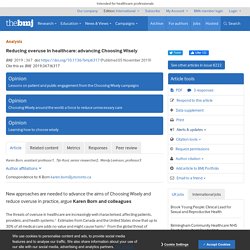
SAGE Journals: Your gateway to world-class journal research. Choosing Wisely India: ten low-value or harmful practices that should be avoided in cancer care. - PubMed - NCBI. Don't just do something, stand there! The value and art of deliberate clinical inertia - Keijzers - 2018 - Emergency Medicine Australasia. Introduction This is the first of a three‐part series, reflecting on our clinical practice and our propensity to do ‘something’ for our patients, be it requesting investigations or providing treatment.
This paper will outline reasons why it is hard to find a balance in avoiding unnecessary investigations and treatments, give an overview of current initiatives encouraging appropriate deliberate clinical inertia (i.e. actively doing nothing as a positive response) and provide suggestions on how to achieve this equilibrium between under‐ and over‐doing. Outline of the problem Very few situations in medicine require immediate action.1 Patients with a more severe spectrum of disease are more likely to benefit from treatment, as beautifully illustrated in the book Overdiagnosed.2 Every action although has potential harms, which need to be weighed against the potential benefits.
Current initiatives encouraging deliberate clinical inertia. Don't just do something, stand there! The value and art of deliberate clinical inertia - Keijzers - 2018 - Emergency Medicine Australasia. Can behavioural science help reduce unnecessary medical tests? Up to one in three medical tests and treatments in Canada are not needed, and can expose patients to harm, stress, and longer wait times.
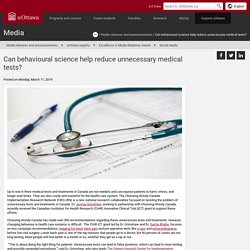
They are also costly and wasteful for the health-care system. The Choosing Wisely Canada Implementation Research Network (CWC-IRN) is a new national research collaborative focused on tackling the problem of unnecessary tests and treatments in Canada. Dr. Jeremy Grimshaw, working in partnership with Choosing Wisely Canada, recently received the Canadian Institutes for Health Research (CIHR) Innovative Clinical Trial (iCT) grant to support these efforts. Curbing Unnecessary and Wasted Diagnostic Imaging. Despite modest effects from initiatives such as the Choosing Wisely campaign, unnecessary diagnostic imaging remains a substantial problem in the United States.1-3 Significant between-country differences probably reflect largely wasted overuse.
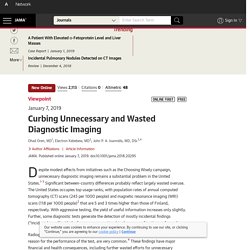
The United States occupies top usage ranks, with population rates of annual computed tomography (CT) scans (245 per 1000 people) and magnetic resonance imaging (MRI) scans (118 per 1000 people)2 that are 5 and 3 times higher than those of Finland, respectively. With aggressive testing, the yield of useful information increases only slightly. Further, some diagnostic tests generate the detection of mostly incidental findings (“incidentalomas”) with the frequency proportional to the excess of testing performed. Physicians as stewards of resources. The Institute of Health Economics (IHE) together with the O’Brien Institute for Public Health (O’Brien Institute) held a policy forum on February 8th, 2016, entitled Physicians as Stewards of Resources: Roles, Responsibilities, and Remuneration to inform decision-making regarding the fiscal sustainability of theprovincial healthcare system, with a specific focus on physicians as stewards of healthcare resources.
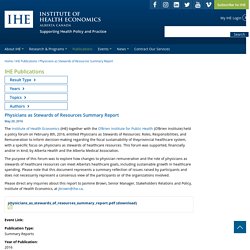
This forum was supported, financially and/or in kind, by Alberta Health and the Alberta Medical Association. The purpose of this forum was to explore how changes to physician remuneration and the role of physicians as stewards of healthcare resources can meet Alberta’s healthcare goals, including sustainable growth in healthcare spending. Please note that this document represents a summary reflection of issues raised by participants and does not necessarily represent a consensus view of the participants or of the organizations involved. Event Link: Getting Physicians To Stop Delivering Low-Value Services. What can be done to encourage doctors and other clinicians to heed new evidence when it shows the tests or procedures they are delivering are in fact not helping their patients—and may even harm them?
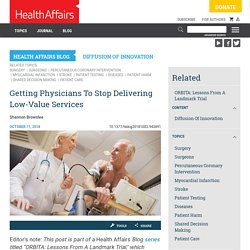
This question has become increasingly relevant in the face of a growing number of studies casting doubt on the safety and efficacy of commonly used treatments and tests. Even when new evidence is clearly negative, clinicians often resist abandoning a service they have believed in, and developed expertise in, especially when that service provides a significant portion of their livelihoods. Take the PSA, or Prostate Specific Antigen test, widely promoted for more than three decades to screen for prostate cancer. Negotiating “unnecessary” Microclinical, macropolitical, and coproduction approaches to defining necessity in care. Journalofhospitalmedicine. WONCA Europe Position Paper on Overdiagnosis and Action to Be Taken. Choosing Wisely in primary care. Usage of Depression Pills Almost Halved Among Children in Denmark.
A List of Essential Diagnostics Could Check Over-testing, But Challenges Remain, Say Scientists. New Delhi: A list of essential diagnostics could keep in check the rampant over-testing and over-diagnosing that patients face today.
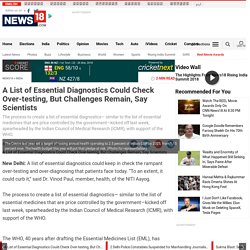
“To an extent, it could curb it,” said Dr. Vinod Paul, member, health, of the NITI Aayog. The process to create a list of essential diagnostics— similar to the list of essential medicines that are price controlled by the government—kicked off last week, spearheaded by the Indian Council of Medical Research (ICMR), with support of the WHO. The WHO, 40 years after drafting the Essential Medicines List (EML), has started work on an Essential Diagnostics List (EDL), which will guide countries as to which diagnostic services, which tests and procedures and therefore, which equipment, is most essential to their public healthcare.
India is the first country to have simultaneously started work on a national EDL. Such regulation will mean a doctor cannot order an MRI on a patient before doing a chest X-Ray, Paul gave an example. The challenge, however, said Dr. Quaternary prevention: reviewing the concept: Quaternary prevention aims to protect patients from medical harm: European Journal of General Practice: Vol 24, No 1. Health Informatics Tools to Improve Utilization of Laboratory Tests. Don't just do something, stand there! The value and art of deliberate clinical inertia - Keijzers - 2018 - Emergency Medicine Australasia. Trends in Troponin-Only Testing for AMI in Academic Teaching Hospitals and the Impact of Choosing Wisely® Medical overuse and quaternary prevention in primary care – A qualitative study with general practitioners.
Guest Commentary: Choosing Wisely changed the conversation; the next challenge is changing practice. It took many decades for it to become widely recognized that one-third of healthcare has little or no value.
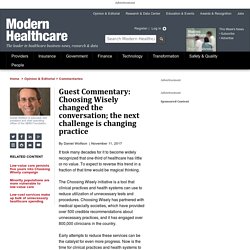
To expect to reverse this trend in a fraction of that time would be magical thinking. The Choosing Wisely initiative is a tool that clinical practices and health systems can use to reduce utilization of unnecessary tests and procedures. Choosing Wisely has partnered with medical specialty societies, which have provided over 500 credible recommendations about unnecessary practices, and it has engaged over 800,000 clinicians in the country.
Early attempts to reduce these services can be the catalyst for even more progress. Now is the time for clinical practices and health systems to use that tool—Choosing Wisely—along with system changes to dramatically alter the use of unnecessary services. Five years ago, conversations about healthcare in the U.S. were fraught with tension. Fewer lab tests can produce better patient results - Modern Healthcare Modern Healthcare business news, research, data and events %] Choosing Wisely: How To Fulfill The Promise In The Next 5 Years. + Author Affiliations ↵*Corresponding author Abstract.
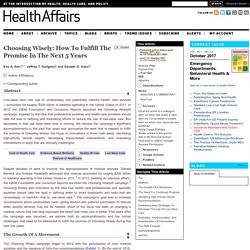
Is Canadian health care choosing wisely? By Adam Kassam Mon., Oct. 16, 2017 One of the most important campaigns in Canada has nothing to do with politics.
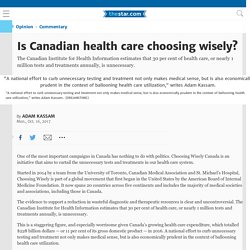
Choosing Wisely Canada is an initiative that aims to curtail the unnecessary tests and treatments in our health care system. Started in 2014 by a team from the University of Toronto, Canadian Medical Association and St. Senior medicine: When ‘more’ isn’t better. Dr.
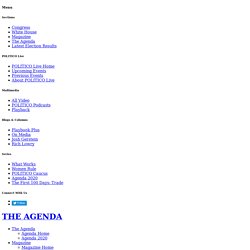
George Taler still makes house calls, driving his scuffed green Toyota sedan from one apartment to another, carrying a blue satchel with a laptop, hand sanitizer and a few medical tools. Inside each apartment, he practices medicine with old-fashioned care, spending half an hour with each patient. He takes out a stethoscope, a blood pressure cuff, a pulse oximeter. The overdiagnosis community targets solutions – The BMJ.
Documenting overdiagnosis is the easy part. The real challenge is how to manage it Lisa M. Schwartz, Steven Woloshin, Iona Heath, Ray Moynihan, Helen Macdonald Once upon a time, overdiagnosis and too much medicine were fringe ideas. That is no longer the case. Similarly, the Choosing Wisely campaign, which seeks “to help providers and patients engage in conversations about the overuse of tests and procedures” has spread from the United States to over 20 countries, most recently to Canada and the United Kingdom. [1, 2] Some media outlets have also contributed, notably the Seattle Time‘s series “Suddenly Sick,” the Milwaukee Journal Sentinel‘s Risk/Reward series, and most recently, BBC Radio’s Inside Health programme and national television programmes from Danmarks Radio on overdiagnosis and informed choice.
VV Studie Choosing Wisely en final. We need an Overdiagnosis Awareness month. September was Prostate and Thyroid Cancer Awareness Month, October was Breast Cancer Awareness Month, and November was Lung Cancer Awareness Month. We should designate December as Cancer Overdiagnosis Awareness month, because a lot of cancers diagnosed by screening tests will never kill you. Through decades of advocacy by patients, family members, and doctors, the public has never been more aware of the dangers of slow-growing, yet sometimes deadly cancers like thyroid, breast, and prostate cancer. Primary Care Physicians' Action Plans for Responding to Results of Screening Tests Based on the Concept of Quaternary Prevention. CMPA - The right test at the right time: Striking the proper balance. Originally published September 2014 / Revised April 2017 P1403-3-E In an era of fiscal prudence, combined with ongoing efforts to improve the safety of care, the efficient and effective utilization of healthcare resources remains a priority for governments, health authorities, administrators, and healthcare providers.
Within this context, physicians must reconcile their obligation to act fiscally responsibly while also providing safe care. It is increasingly recognized that excessive or unnecessary medical tests and procedures do not benefit patients, and can detract from sparse healthcare resources. It is challenging for doctors to strike the proper balance when ordering tests and carrying out procedures. When responding to fiscal realities while also providing safe care, doctors will want to rely on their knowledge, clinical judgment, and the best available evidence to guide their decisions. Five years wisely: A look at Choosing Wisely's effort to reduce unnecessary medical care - HealthNewsReview.org. Do you really need a CT scan for a headache? Or a test for Vitamin D? Maybe not, yet these are a few of the hundreds of examples of medical tests or treatments that are given to patients but may be unnecessary and even possibly harmful, according to the folks behind Choosing Wisely, an initiative that began in 2012.
The organization “seeks to advance a national dialogue on avoiding wasteful or unnecessary medical tests, treatments and procedures.” Elsevier: Article Locator. Choosing Wisely Infographic Update0317. How one pediatric hospital targeted unnecessary care—and saved $1 million. The effect of a test ordering software intervention on the prescription of unnecessary laboratory tests - a randomized controlled trial.
Informatics has undoubtedly changed the way societies live, socialize, learn, work, and deal with healthcare. We now live in a period of increasing concern about the excessive presence of medicine in our lives [1, 2, 3]. When inefficient software is combined with a nonevidence-based medical practice, there is the risk of patient harm, significant impact to quality of life, and damage to the healthcare system due to unnecessary costs. The Top 20 MVPs (Most Valuable Pills) of All Time. “The young physician starts life with 20 drugs for each disease, and the old physician ends life with one drug for 20 diseases.”
Sir William Osler (1849 – 1919) The world has recently been devastated by a strange and rather specific apocalyptic event that has left us with the following: Tackling Wasteful Spending on Health - en. Overdiagnosis – Norwegian general practitioners show the way. The position paper on overdiagnosis from the Norwegian College of General Practice is the first of its kind to be adopted by a national medical college. In terms of a critique of the profession, it represents a milestone in Norwegian medical history. The document culminates in a challenge to medical communities, health authorities, politicians and the general public. The Strategy That Will Fix Health Care. In health care, the days of business as usual are over. Around the world, every health care system is struggling with rising costs and uneven quality despite the hard work of well-intentioned, well-trained clinicians.
FPs Can Shape Social Determinants of Health Outside Clinic : AAFP Leader Voices. Heterogeneity in Treatment Effects and Choosing Wisely. 'Risk-sharing' at centre of Alberta's modified doctor pay deal - Edmonton. Amendments to the Alberta physician compensation agreement have financial implications if the amount set aside to pay doctors is exceeded in the next two years. The deal, approved by 74 per cent of physicians who took part in last month's ratification vote, modifies the seven-year agreement, which expires on March 31, 2018. Study shows doctors defy recommendations, still order imaging for back pain. Many doctors who order CT or MRI scans for patients with low back pain do so fearing that patients will be upset if they do not get imaging and because there is too little time to explain the risks and benefits of the tests, a new study found.
The Choosing Wisely campaign, launched by the American Board of Internal Medicine in 2012, recommends against imaging scans for low back pain unless there are specific “red flags.” Medicine's ethical responsibility for health care reform. Toward a sustainable and wise healthcare approach: potential contributions from hospital Internal Medicine Departments to reducing inappropriate medical spending. Introduction According to the latest data from the Ministry of Health, in Italy, over the past ten years health spending has increased from 76 to slightly less than 113 billion euro, with a growth of approximately 37 billion euro.
Government data for the year 20111 have shown that Italian public healthcare spending is equivalent to 7.1% of gross domestic product (GDP), and 1842 euro per capita per year. In a comparison between Italy and the European Union, the incidence of public health expenditure on GDP in the year 2009 was 7.3%, compared to 8.2% reported in Europe, highlighting the fact that on average, in Italy, we spend less on healthcare. A Program to Prevent Catheter-Associated Urinary Tract Infection in Acute Care. Rita Redberg: an unwavering campaigner against the harms of too much medicine. CMAJ Mobile. mBiosphere: And now for something completely different: optimistic news from the world of antibiotic stewardship. Recommendations on routine screening pelvic examination. Big benefits by radiologist review of—and consultation over—imaging orders. Effect of Behavioral Interventions on Inappropriate Antibiotic Prescribing Among Primary Care Practices: A Randomized Clinical Trial.
Take Back Health: Join the Right Care Alliance. NHS Scotland: Realistic Medicine. Effectiveness of interventions designed to reduce the use of imaging for low-back pain: a systematic review. Choosing Wisely: setbacks and progress. Could bedside manner cut extra CT scans? A Top-Five List for Emergency Medicine: A Pilot Project to Improve the Value of Emergency Care. How to make less more: empathy can fill the gap left by reducing unnecessary care. Controlling Waste: What's in it for Us? Responding to the Challenge of Overdiagnosis. Centre to target wasted research. Patients’ experiences of treatment burden: so much more than a series of physical side effects! Medical Reversal: Why We Must Raise the Bar Before Adopting New Technologies. Disease definitions linked to pharmaceutical companies. The Bow Tie Model of 21st Century Palliative Care.
Effectiveness of a computerized alert system based on re-testing intervals for limiting the inappropriateness of laboratory test requests. How about an item of no-service fee? Best Advice Guide: Physician Remuneration in a Patient's Medical Home - The College of Family Physicians of Canada. Choosing Wisely Canada seeks system change. Overcoming the Therapeutic Illusion. Medical students choose wisely. Choosing Wisely Alberta aims to reduce unnecessary medical tests and treatments - Calgary. Early Trends Among Seven Recommendations From the Choosing Wisely Campaign.
Choosing Wisely Lists Too Meek? Choosing (Medicine) Wisely: Good Answers for Good Questions "Choosing Wisely Canada" and antimicrobial stewardship: A shared focus on reducing unnecessary care. Choosing Wisely in the UK: the Academy of Medical Royal Colleges’ initiative to reduce the harms of too much medicine. Choosing Wisely and Encouraging Effective Treatment. CMAJ Test Your Knowledge Results: Choosing Wisely Canada. Choosing Wisely in the UK: reducing the harms of too much medicine.
Choosing Wisely: Helping Physicians and Patients Make Smart Decisions About Their Care. Current Status of Choosing Wisely in Japan. Choosing Wisely: assessment of current US top five list recommendations’ trustworthiness using a pragmatic approach. Smarter medicine: do physicians need political pressure to eliminate useless interventions? Over 150 potentially low-value health care practices: an Australian study.